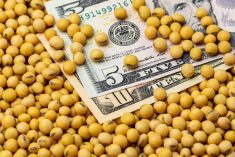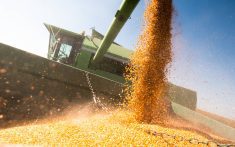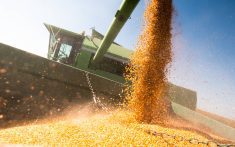Chicago | Reuters—Chicago soybean futures edged higher on Wednesday as U.S. Vice President Kamala Harris’ lead over Republican challenger Donald Trump in some election polls calmed concerns that a trade war with China could heat up, according to analysts.
A flurry of recent export demand lent support to corn futures, analysts said. Wheat futures followed corn higher.
The Chicago Board of Trade’s most-active soybean contract Sv1 settled up 5-3/4 cents at $9.97-1/2 per bushel, while CBOT corn Cv1 settled up 2-1/2 cents at $4.19 a bushel.
Read Also

Spain alerts WHO of swine flu virus believed to have been transmitted between people
Spain has alerted the World Health Organization of what it believes to be a person-to-person transmission of the swine flu virus in its A(H1N1)v variant, a spokesperson for health authorities in the Catalonia region confirmed to Reuters on Friday.
CBOT wheat Wv1 settled up 2-1/2 cents at $5.78-1/2 per bushel.
Harris led Trump by a 46-43 per cent margin in a Reuters/Ipsos poll published on Tuesday. Her lead in the six-day poll, which closed on Monday, reinforces the view that the race is extraordinarily tight with just two weeks left before the Nov. 5 election. Some other polls have also shown Harris leading the former U.S. president.
“I think the bean market got a little optimistic that under her presidency, the odds of seeing a huge increase in tariffs on Chinese imports would be less than for a Trump administration,” said Mark Soderberg, senior agricultural market analyst with ADM Investor Services.
Increased tariffs on imports from China could spur retaliation from the leading soybean importer.
Meanwhile, U.S. soybean export premiums are at a 14-month high as merchants race to ship out a record U.S. harvest ahead of the U.S. election and amid fears of renewed trade tensions.
In corn, said Soderberg, “We’re still seeing good export demand, not from China, but from pretty much everywhere else in the world.”
Meanwhile, wheat futures still faced pressure from Russia’s recent efforts to regulate its grain trade.
Russia, the world’s biggest wheat exporter, has proposed the creation of a grain exchange among BRICS countries – Brazil, Russia, India, China, and South Africa – which could later be expanded to trade other major commodities such as oil, gas and metals.
—Additional reporting by Gus Trompiz in Paris and Naveen Thukral in Singapore















